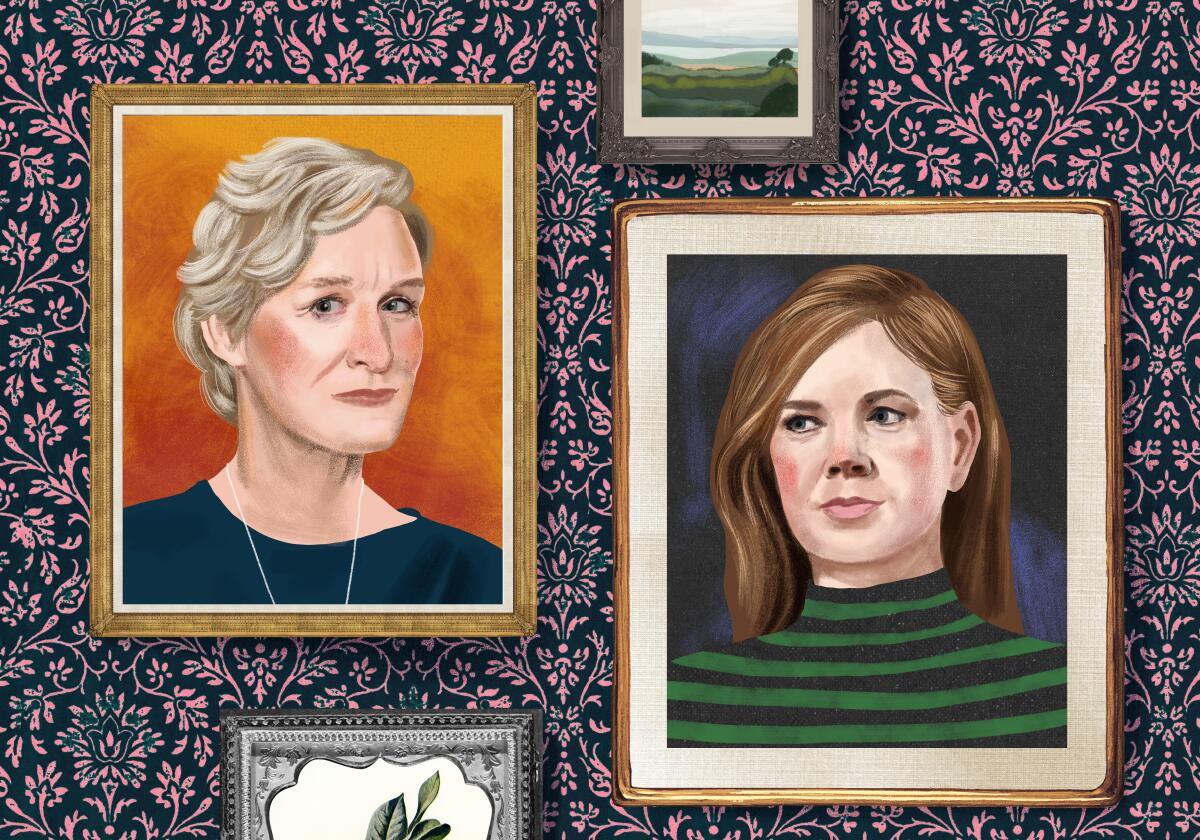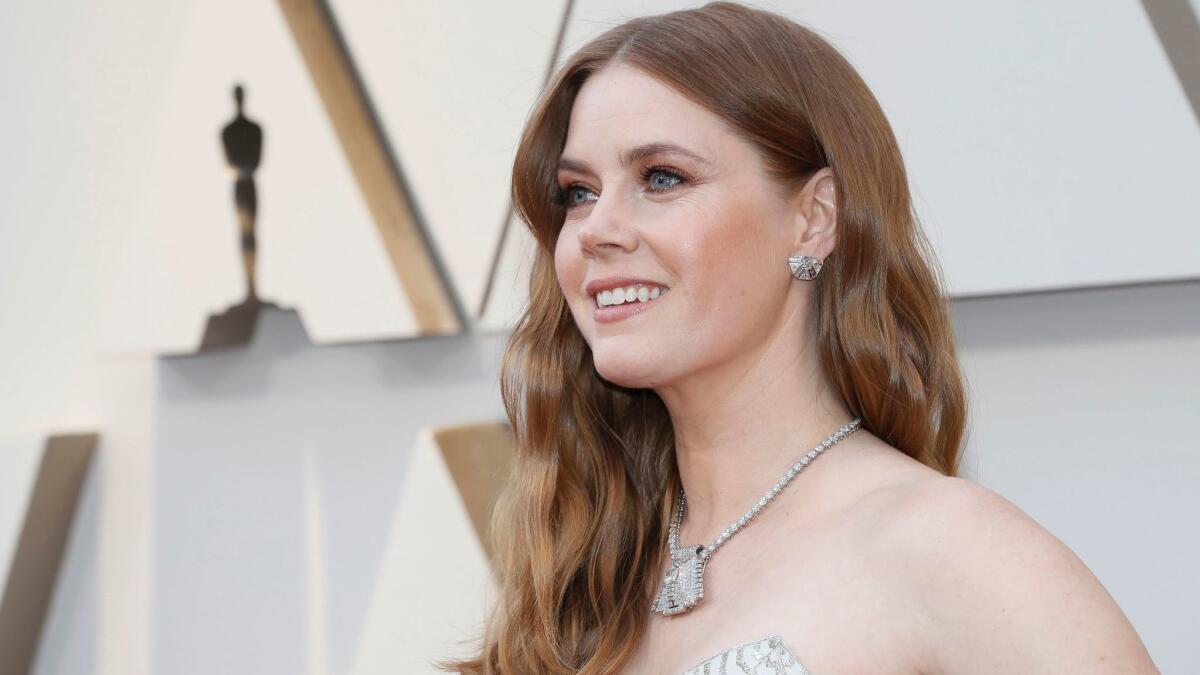Family drew Amy Adams and Glenn Close to ‘Hillbilly Elegy.’ (Family, and Terminators.)

- Share via
Glenn Close’s turn as the ornery, larger-than-life and fiercely loyal grandmother Mamaw in “Hillbilly Elegy” wasn’t even fully unleashed into the world before it took on a life of its own. A friend of Close’s daughter, the actress Annie Starke, dressed up as Mamaw for Halloween. This friend, it should be noted, was a man, who donned a curly wig, big glasses, an oversize T-shirt and a dangling, lit cigarette — a costume pick not all that surprising since the Guardian already crowned Mamaw a style icon.
“I was so chuffed by that,” Close says, smiling. Meanwhile, Amy Adams, who plays Mamaw’s drug-addicted, unstable daughter Bev in “Hillbilly Elegy,” which begins streaming Tuesday on Netflix, can’t stop laughing at Mamaw’s unlikely ascent to sartorial stardom. We’re talking by Zoom, of course, with Adams calling from her home in Los Angeles and Close connecting from Bozeman, Montana, where she moved last December to be close to her siblings.
“Hillbilly Elegy” is based on J.D. Vance’s 2016 memoir, which detailed his Rust Belt upbringing and drew both praise and criticism for its cultural musings about the causes of white poverty. The movie, directed by Ron Howard, mostly steers clear of the author’s conservative politics, concentrating on the family’s story and Vance’s escape from the destructive behavioral patterns that, he believes, mire poor people in hopelessness. (As Mamaw declares, “Family’s the only thing that means a goddamn.”)
We spoke a week after election day, but both actresses also dutifully avoid anything political when discussing the film. They say it was the book’s vivid portraits of women struggling with dire circumstances and personal demons that appealed to them.
Some may call it obvious awards bait, and point to the fact that Adams, with six Oscar nominations, and Close, with seven, enjoy rarefied status among the most nominated actresses ever to not actually win Academy Awards. Surely they must make every career decision based solely on what could bring that trophy home, right?
But talking to Adams and Close, together and separately, it’s easy to feel their connection to the material’s domestic side. Their own families, particularly their daughters, are central to their lives. Emotions bubble up quickly during our conversations. Tears are constantly being dabbed away.
Close lays part of the blame on the pandemic; in COVID times, she says, the smallest things make her cry. That revelation itself makes Adams tear up.
Their current coping methods revolve around comfort food. Adams has noticed a “weird” amount of cheese in her refrigerator lately. Close has been devouring Doritos, Oreos and coffee ice cream, the same snacks, not coincidentally, that her character, Alex, ate in “Fatal Attraction” when things were going south.
“Doritos, I really have to stay away from,” Close says. “I learned when you eat a Dorito, it lights up the same area of your brain as cocaine.”
Adams doesn’t miss a beat. “My daughter, of course, loves Doritos. So that makes sense.”
Adams’ daughter, 10-year-old Aviana, figures into why she was interested in “Hillbilly Elegy” in the first place.
“Examining generational trauma and how we pass things down from one generation to the next is something I’m interested in — and something I’m trying not to do to my daughter,” Adams says. “It’s really about awareness to me.”
Asked what things about herself that she doesn’t want her daughter to inherit, Adams launches into a cheerful dissection of the differences between worry and pragmatism. She’d like Avi to be rational, but not over-evaluate every situation. Adams says she spends a lot of time on the “treadmill of my mind, getting nowhere.” Two weeks before Thanksgiving, on one of her many sleepless nights, she spent a fair amount of time debating when would be the optimum time to preorder her Thanksgiving shopping list.
“There are so many bigger things going on, but I think micromanaging a meal helps me think I’m in control,” Adams, 46, says. It should be noted that Adams tells me this while seated artfully in her kitchen in front of two topiary trees that make her look like she’s wearing Mickey Mouse ears.
Close, on the other hand, is talking about moose, not mouse. She sees all kinds of wildlife where she lives in Montana — mountain lions, deer, elk, bears, grouse and, yes, moose. She plans on going snowshoeing and cross-country skiing when the weather’s right. The place has been a sanctuary for her this past year.
“One of the reasons I came to Montana to be with my family is that I’ve sacrificed so much family time in my career, and you realize that the only thing that really counts is family,” Close, 73, says. Her daughter lives in Los Angeles, a city Close says is “not in her DNA.” But Bozeman is closer than New York.
Close and Adams had never talked outside of brief conversations at awards shows. “We were red carpet buddies,” Adams says, noting all the times they bumped into each other a couple of years ago when Close earned an Oscar nomination for “The Wife” and Adams for portraying Lynne Cheney in “Vice.”
“You’ve been on that big red carpet six times, right?” Close asks Adams about the Oscars.
“But you’ve been seven times,” Adams responds.
When Close tells her she’s catching up, Adams cracks up. “I can’t even win at losing,” she says. “Please say that we’re laughing because that’s like the most self-pitying thing that’s ever come out of my mouth.”

Adams surprises Close when she reveals that she first saw her in “The World According to Garp,” the 1982 adaptation of John Irving’s bittersweet bestseller in which Close played Garp’s strong-willed, feminist mother. But Adams is just getting warmed up.
“I saw ‘Fatal Attraction’ ... with my mom,” Adams tells Close. And, yes, it was awkward as you might expect, Adams being 13 and watching Close and Michael Douglas throwing the kitchen sink into a sex scene.
“But the thing that stuck with me is that I’ve never been more terrified in my entire life than when Glenn came out of that bathtub,” Adams says. “I must have clung to the theater ceiling.”
Adams is more circumspect when talking about her work in “Hillbilly Elegy” and how she found a way into portraying Vance’s mom, Bev, whose abuses and addictions fuel much of the movie’s drama. (The movie’s end titles state Bev has been sober for six years.) Adams and Close met Bev and other relatives in Middletown, Ohio, where Vance’s family moved from Kentucky’s Appalachia region. Director Howard was there too, and he remembers Adams repeating “these things ring a bell” as she talked with people.
“Amy’s private, and I didn’t press her because actors and their secrets are a powerful thing,” Howard says.
“And why would I release my superpower?” Adams says, when hearing Howard’s observation. “I’m very cautious about what I share because a lot of what I pull from doesn’t belong to me. I don’t want to tell someone else’s story to further my own narrative.”
To play the force of nature that was Mamaw, a quick-tempered woman who lit her husband on fire and also raised Vance, offering stability absent in his own home, Close watched home movies and spoke extensively with Vance. Howard says they dialed the character back, though reviewers, who have not been kind to the movie, might disagree.
“Mamaw made a lot of mistakes, and I think she realized that, but without her, J.D. would not have broken that cycle,” Close says.
Mamaw was also the source of a bounty of homespun wisdom, such as the earlier quote about family’s importance. She also apparently had a fondness for “Terminator 2: Judgment Day,” and tells the young Vance in the movie: “Everyone in this world is one of three kinds — good Terminator, a bad Terminator and neutral.”
So, going by “Terminator 2,” Arnold Schwarzenegger would be the good Terminator and Robert Patrick’s T-1000 the bad Terminator. But a neutral Terminator? I’ve seen six Terminator movies, and I don’t remember an indifferent Terminator. What gives?
“We all live in a gray area and that’s where we have to deal with life,” Close muses. “So maybe the neutral would mean a willingness to take life as it comes. It’s not all good. And it’s not all bad. It’s in the middle.”
“I was just talking with my daughter about that,” Adams says, “about living in the middle, about how not everything’s good, not everything’s bad and people aren’t all good or all bad, for the most part. I have my opinions about a few people we don’t need to talk about. But most of life happens in the middle ... and those are the parts that you’ll remember.”
More to Read
Only good movies
Get the Indie Focus newsletter, Mark Olsen's weekly guide to the world of cinema.
You may occasionally receive promotional content from the Los Angeles Times.











